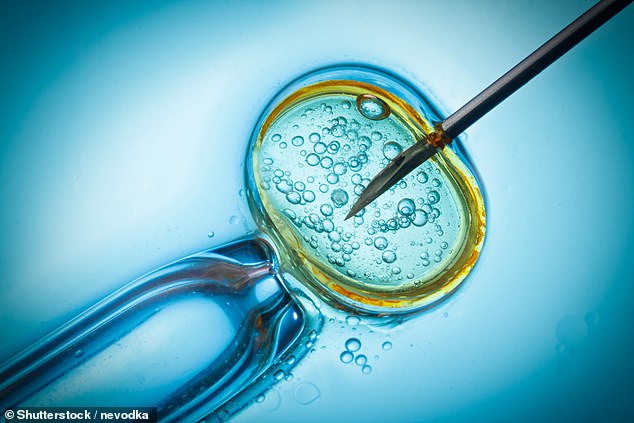‘Milestone moment’ as Brits conceived with donor egg or sperm can contact biological parents from next month
- British people can ask for name, date of birth and last known address
- In 2030, 11,427 young people will be able to request identifying data
From next month, people conceived through egg or sperm donation will be able to trace their biological parents.
Changes to the UK’s donor anonymity law mean the first donor-conceived adults who can request information about their biological origins will turn 18.
The Human Fertilization and Embryology Authority (HFEA) said around 30 donor-conceived 18-year-olds will be eligible to find their donor by the end of the year.
Due to the ‘monumental’ changes in the donation conditions, 11,427 young people will be able to request identification data – such as name, date of birth and last known address – in 2030.
Dr. Marta Jansa Perez, from the British Fertility Society, described it as a ‘milestone’ moment.
By 2030, 11,427 young people will be able to request identification data upon reaching the age of 18

More than 70,000 donor-conceived children have been born since 1991 and donor conception now accounts for 1 in 6 IVF births in Britain and 1 in 170 of all births in Britain
She said: ‘This is a very important milestone for people conceived through the use of donor eggs or sperm since 2005, as they can receive identifying information about their donors at the age of 18.
‘The British Fertility Society would like to encourage all donors to re-contact the clinic where they donated or contact the HFEA to ensure their contact details are up to date, so that people with conceived by a donor can obtain information about their genetic origins if they wish.’
The law surrounding the release of a sperm, egg or embryo donor’s personal information changed in April 2005, when it was accepted that everyone has the right to know their genetic history.
Data from the HFEA shows that by the end of 2024, more than 700 donor-conceived people will be able to request identifying information about their donor if they wish.
It is launching a #WhoIsMyDonor campaign to encourage donors to ensure their details are up to date at their clinic as the first young adults request information.
Rachel Cutting, HFEA director of information and compliance, said: ‘An egg or sperm donation made 18 years ago could rightly be a distant memory for some, and forgetting to update contact details is easy to do.
‘However, giving the right information to the conceived person and notifying the donor that a request has been made can help facilitate successful communication and reduce the emotional impact.
She added: ‘One quick email or phone call from a donor to the clinic where they donated, or to the HFEA, can make a huge difference in the life of a donor-conceived person.’
More than 70,000 donor-conceived children have been born since 1991 and donor conception now accounts for 1 in 6 IVF births in Britain and 1 in 170 of all births in Britain.
The regulator predicts that by 2030 there will be an average of one or two donor-conceived children in every English state primary school.
Professor Jackson Kirkman-Brown, president of the Association for Reproductive and Clinical Scientists (ARCS), said it was important that those affected took advantage of the support on offer.
He said some people born by donation had used tests taken from their ancestors to trace their biological families, without having access to such help and information.
‘This is a very important time for young adults conceived using donor sperm or eggs. “Many hope to learn more about their donors when they turn 18,” he said.
‘There are now many other ways in which a donor can be identified, such as family ancestry testing, and historical donors will not usually have had information and support about this – so we encourage them to get in touch now and get the guidance, support and information they need. need and deserve.
‘Being a donor is an incredible gift and, beyond the sector, ARCS is keen to recognize and support those who enable people to have the families they want.’
